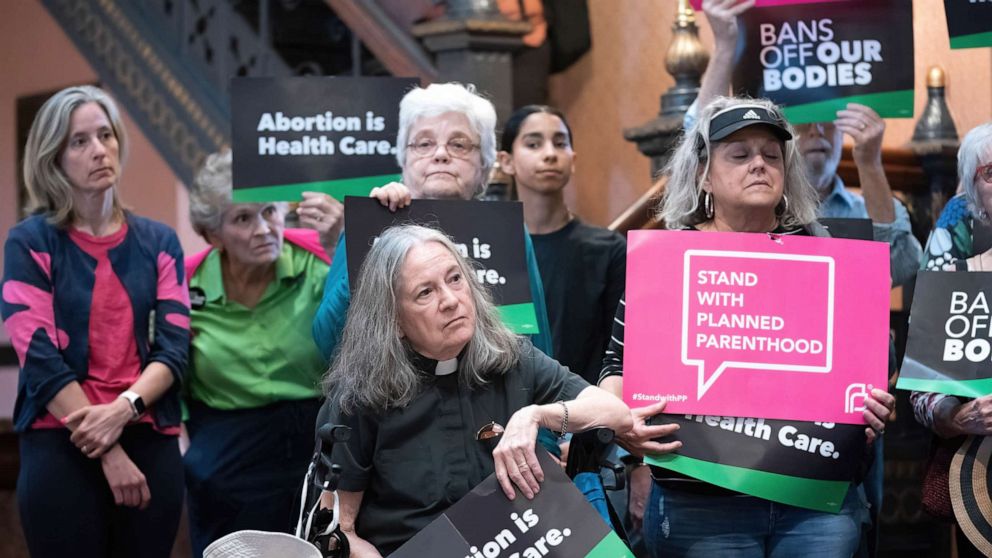Global Courant 2023-05-26 07:36:37
South Carolina Governor Henry McMaster signed a six-week abortion ban on Thursday, effective immediately. The new ban bans all abortions after fetal heart activity has been detected, which usually occurs after six weeks of gestation, with limited exceptions, according to the ban.
“With my signature, the Fetal Heartbeat and Protection from Abortion Act is now law and will immediately start saving the lives of unborn children,” McMaster said. “This is a great day for life in South Carolina, but the battle is not over. We stand ready to defend this legislation against all challenges and are confident that we will succeed. The right to life must will be preserved and we will do everything we can.” can protect it.”
Abortion providers Planned Parenthood and Greenville Women’s Clinic have filed a lawsuit to challenge the state’s ban, asking for a temporary restraining order that would prevent enforcement of the law.
“Abortion providers have asked a state court to block S. 474 because it violates South Carolinians’ constitutional rights to privacy, equal protection and due process by prohibiting abortion, failing to provide adequate protection for patients’ health, conditioning assault survivors’ access to abortion following the disclosure of their personal information to law enforcement, violating the Medicaid Act and improperly targeting Planned Parenthood through an unconstitutional affidavit,” Planned Parenthood said in a statement.
White House press secretary Karine Jean-Pierre said in a written statement Thursday night that South Carolina’s “extreme and dangerous” ban on abortions beyond six weeks “will criminalize healthcare providers and cause delays and denial of health and life-saving care.” “
“The ban in South Carolina will cut off access to abortion for women in the state and for those across the region for whom South Carolina is their best health care option,” Jean-Pierre said.
McMaster signed an earlier so-called “heartbeat ban” in 2021, but it was overturned by the state Supreme Court in January.
Fifteen states have shut down nearly all abortion services since the U.S. Supreme Court overturned Roe v. Wade and ended federal protections for abortion rights.
Governor Henry McMaster addresses the media after Brian Gaines is sworn in as South Carolina Comptroller General at the South Carolina State House on Friday, May 11, 2023.
Joshua Boucher/The State/Tribune News Service via Getty Images
According to the new ban, abortion is allowed to prevent the death of the pregnant woman, to avoid the serious risk of a substantial and irreversible impairment of an important bodily function, in cases of rape and incest and if the fetus has a fatal defect , according to the law. to the ban. The exception does not include psychological and emotional conditions.
Conditions listed under the exception are molar pregnancy, partial molar pregnancy, ruptured ovum, ectopic pregnancy, severe preeclampsia, HELLP syndrome, placental abruption, severe physical maternal trauma, uterine rupture, intrauterine fetal death and miscarriage, according to the bill .
Anyone who violates the ban is guilty of a misdemeanor and faces a fine of $10,000, imprisonment for up to two years, or both upon conviction. Doctors or medical providers found guilty of performing illegal abortions will also have their licenses revoked.
Planned Parenthood and its partners said they are willing to challenge the ban in court.
“Abortion is already difficult to access in South Carolina, with only three abortion clinics in the state and a series of restrictions on access imposed by state legislators. South Carolina ranks 43rd – in the bottom 10 of all states – with the highest maternal women here are three times more likely to die during pregnancy or childbirth than the average American woman,” Planned Parenthood said in a statement.
Abortion rights activists await the arrival of state lawmakers for a Senate vote on a ban on abortion after six weeks of pregnancy at the South Carolina Statehouse on May 23, 2023 in Columbia, SC
Sean Rayford/Getty Images
‘Sister Senators’ fight against ban
A group of five female senators, the only five in the legislative body, has been fighting against the bill. The group, which has adopted the term “sister senators,” told ABC News that a short holiday week at the end of the legislative session would be when the men would “shove it down our throats.”
Even before the vote, they felt like a back room had been closed to get it through. After three attempts, the senators’ filibuster failed to stop the bill.
“Women make up 51% of South Carolina’s population (but have only 14% of the General Assembly and even less than that in the Senate. What I believe is that women will come to the polls,” Senator Sandy Senn said.
The group of women is very different — three Republicans, one Democrat and one independent — but they are all religious mothers who are certain that this bill passing the Senate would be bad for women in the state. None of them considered themselves women’s rights advocates or feminists, and all said they were “pro-life.”
“We all believe in life. We believe in life for the woman and life for the child,” Senator Margie Bright-Matthews told ABC News.
They needed two men to cross Tuesday to vote with them to block the ban, but one of their previous allies had gone black, which they knew was not a good sign.
Abortion options for women in the Deep South are closing fast now, with Florida’s six-week ban pending a court ruling soon and North Carolina’s 12-week ban taking effect.
What’s in the ban?
Women must make personal doctor’s appointments before they can have an abortion.
Under the ban, pregnant women cannot be prosecuted or held civilly liable for violations of the ban.
If the fetus lives in the womb, the bill requires doctors to make reasonable efforts to preserve the life of the unborn child, provided it does not pose a risk to the pregnant woman’s health. Entities that violate this will be fined up to $50,000 under the bill.
Doctors who perform abortions under the health exceptions must, according to the bill, explain in their medical records why they believe the woman qualifies for the exception.
Protesters gather with signs and placards in the lobby of the South Carolina Statehouse, May 16, 2023, in Columbia, SC
SOPA Images/LightRocket via Getty Images
Abortions performed under the rape and incest exceptions must be reported within 24 hours to the sheriff in the county where the abortion was performed. Doctors must tell the patient that they will report the rape before the abortion is performed.
Doctors are also required to keep a copy of the patient’s record for seven years after an abortion has been performed under the exception. Failure to do so would, under the bill, be a felony punishable by up to two years in prison and a $10,000 fine for the physician.
Pregnant women who have an abortion performed in violation of the law may seek actual and punitive damages from the offender.
Ben Gittleson of ABC News contributed to this report.








